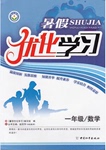题目内容
—I speak to Miss Zhang, please?
—Hold on. Miss Zhang, on the phone.
|
A.Someone is looking for you |
B.Here is a telephone for you |
|
C.You’re called |
D.You’re wanted |
D
【解析】略

 新思维假期作业暑假吉林大学出版社系列答案
新思维假期作业暑假吉林大学出版社系列答案 蓝天教育暑假优化学习系列答案
蓝天教育暑假优化学习系列答案I still clearly remember that day. I was on the side of the road for close to four hours with my big Jeep. I put signs in the windows that said, “NEED A JACK(千斤顶)”.
Right as I was about to give up, a truck stopped and a man got off. He sized up the situation and went back to take a jack. After about two hours, we finished the job with sweats. We were both dirty. His wife produced a large water jug for us to wash our hands in.
I tried to put $20 in the man’s hand, but he wouldn’t take it, so instead I went up and gave it to his wife as quietly as I could. I thanked them up one side and down the other. I asked the little girl, their daughter, where they lived, thinking maybe I’d send them a gift. She said they lived in Mexico. They were in Oregon now so Mommy and Daddy could pick cherries for the next few weeks. After that, they were going to pick peaches, and then go back home.
After I said my goodbyes and started walking back to the Jeep, the girl called out and asked if I’d had lunch. When I told her no, she ran up and handed me a tamale(玉米粽子). I thanked them again and walked back to my car. When I opened the tamale, what did I find inside? My $20 bill! I ran to the van and the guy rolled down his window. He saw the $20 in my hand, started shaking his head smiling, and with what looked like great concentration said in English: “Today you, tomorrow me.” Then he rolled up his window and drove away, with his daughter waving to me from the back.
This family, working on a seasonal basis where time is money, took a couple of hours to help a stranger while others passed by quietly.
Since then I’ve helped many people like the Mexican family. I didn’t accept money. But every time I was able to help, I felt as if I was putting something in the bank.
1.From the passage we know that __________.
|
A.the Mexican man couldn’t speak English |
|
B.the author’s car broke down on the road |
|
C.the Mexican family came to Oregon for a visit |
|
D.$20 was a small amount for the Mexican family |
2.Why did the author give the money quietly to the man’s wife?
|
A.Because the man had refused to accept it. |
|
B.Because the man’s wife needn’t wash her hands. |
|
C.Because the author thought the Mexican family was poor. |
|
D.Because the author thought the man’s wife would take it. |
3.The Mexican man helped the author because he tended to think that ___________.
|
A.it was completely wrong for others to pass by quietly |
|
B.it was quite easy to help the author mend the jeep |
|
C.it was possible that everyone might get into trouble |
|
D.the author was a polite stranger and deserved the help |
4.Which of the following is TRUE about the author?
|
A.He hated those who didn’t offer help. |
|
B.He would send a present to the family soon. |
|
C.He wondered why they didn’t take the money. |
|
D.He considered helping others as saving money in the bank. |
5.What can we infer from the passage?
|
A.The Mexican family lived a richer life than the author. |
|
B.The Mexican family did seasonal work in Oregon each year. |
|
C.The author was inspired to help others by the Mexican family. |
|
D.What made the writer moved was the tamale given by the girl. |